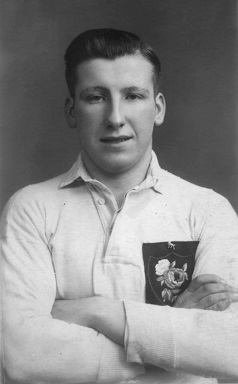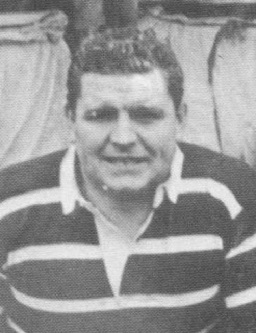Related Research Articles
Peter Fox was an English rugby league footballer who played in the 1950s and 1960s, and coached in the 1970s, 1980s and 1990s. He was the brother of Don and Neil Fox, and together they formed one of the legendary rugby league families.
Deryck Fox is an English former professional rugby league footballer who played in the 1980s and 1990s, and coached in the 1990s, 2000s and 2010s. He played at representative level for Great Britain, England and Yorkshire, and at club level for Featherstone Rovers, Western Suburbs Magpies, Bradford Northern, Batley and Rochdale Hornets, as a scrum-half, and coached at club level for Rochdale Hornets, Shaw Cross ARLFC, Batemans Bay Tigers and Dewsbury Celtic. He attended St John Fisher's RC High School in Dewsbury.
The 1972–73 Northern Rugby Football League season was the 78th season of rugby league football played in England. It would also be the last season whereby the British championship was decided by a play-off system until Super League III in 1998. Dewsbury were crowned champions after defeating Leeds in the Final. The 1972–73 season was also punctuated by the 1972 Rugby League World Cup which was played in France in October and November. At the end of this season the league re-formed into two divisions. The top 16 in the championship would form Division 1 and the bottom 14 Division 2.
Dennis Baddeley was an English professional rugby league footballer who played in the 1940s and 1950s. He played at representative level for Yorkshire, and at club level for Castleford, Wakefield Trinity and Featherstone Rovers, as a wing.
William Isaac C. Stott was an English professional rugby league footballer who played in the 1930s and 1940s. He played at representative level for England and Yorkshire, and at club level for Featherstone Rovers, Broughton Rangers, Oldham, Wakefield Trinity (captain) and Belle Vue Rangers, as a goal-kicking centre or stand-off.

Benjamin Gronow was a Welsh dual-code international rugby union, and professional rugby league footballer who played in the 1900s, 1910s and 1920s. At club level Gronow played under the union code for Bridgend RFC, county rugby for Glamorgan, and international rugby for Wales. He was often used as a utility forward. When he switched to professional league rugby he represented Huddersfield, Grenfell, Batley and Featherstone Rovers (captain), while at representative level, Gronow played for Great Britain and Wales. His playing position varied under the league code being used as a goal-kicking forward.

Frederick "Eric" E. Batten was an English rugby union and professional rugby league footballer who played in the 1930s, 1940s and 1950s, and coached rugby league in the 1950s. He played club level rugby league (RU) for Sandal RUFC, and representative level rugby league (RL) for Great Britain and England, and at club level for Wakefield Trinity, Hunslet, Featherstone Rovers (captain), Leeds, Castleford and Bradford Northern, as a wing, and coached at club level for Featherstone Rovers, and Batley. Eric Batten appeared in eight Challenge Cup Finals; two for Leeds, five for Bradford Northern, and one for Featherstone Rovers, winning three, and losing five, he scored a total of 443 tries during his career, he his third on the all-time try scorers list behind Brian Bevan, and Billy Boston,
Jack Hirst was an English professional rugby league footballer who played in the 1920s and 1930s. He played at representative level for England and Yorkshire, and at club level for Featherstone Rovers as a centre.

John Waring, also known by the nickname of "Sogger", was an English professional rugby league footballer who played in the 1930s and 1940s, and coached in the 1950s, and rugby union footballer who played in the 1940s. He played representative level rugby league (RL) for England, and at club level for Thatto Heath ARLFC, Star Rovers ARLFC, Blackbrook ARLFC, St Helens, Dewsbury, Belle Vue Rangers, Featherstone Rovers, and Warrington, as a wing, centre, stand-off or scrum-half, and representative level rugby union (RU) for the Army and the Combined Services/United Services, as a fly-half, and coached club level rugby league (RL) for Warrington (A-Team).
William J. Derek Howes was a Welsh rugby union and professional rugby league footballer who played in the 1940s and 1950s. He played club level rugby union (RU) for Llanelli RFC, and representative level rugby league (RL) for Wales, and at club level for Wakefield Trinity and Featherstone Rovers, as a second-row or loose forward.
Charles "Charlie" Stuart Annable was an English professional rugby league footballer who played in the 1920s and 1930s. He played at representative level for Yorkshire, and at club level for Featherstone Rovers, and Castleford, as a scrum-half.
Freddie Miller was a professional rugby league footballer who played in the 1930s, 1940s and 1950s. He played at club level for Hull FC and Featherstone Rovers, as a right-footed toe-end style goal-kicking fullback, and was captain of Hull during the 1946–47 season.
John "Johhny" Malpass was an English professional rugby league footballer who played in the 1930s and 1940s, and coached in the 1940s, 1950s and 1960s. He played at representative level for Yorkshire, and at club level for Featherstone Rovers and Wakefield Trinity, as a wing or centre, and coached at club level for Wakefield Trinity, and Featherstone Rovers.

Victor "Vic" Darlison was an English professional rugby league footballer who played in the 1930s, 1940s and 1950s. He played at club level for Goole ARLFC, Featherstone Rovers, Castleford, Wigan, Wakefield Trinity and Bradford Northern, as a hooker or loose forward.

Laurence Gant MBE was an English professional rugby league footballer who played as a second-row forward in the 1940s and 1950s, coached in the 1960s and 1970s, and refereed in the 1950s and 1960s.

Carl Dooler was an English professional rugby league footballer who played in the 1960s and 1970s. He played at representative level for Great Britain, and Yorkshire, and at club level for Sharlston Rovers ARLFC, Featherstone Rovers, Hull Kingston Rovers, York and Batley, as an occasional goal-kicking scrum-half.
Thomas "Tommy" Henry Pickup was an English professional rugby league footballer who played in the 1920s and 1930s. He played at representative level for Yorkshire, and at club level for Wakefield Trinity and Featherstone Rovers, as a centre or stand-off.
Jimmy Russell was a professional rugby league footballer who played in the 1930s, 1940s, and 1950s. He played at club level for Featherstone Rovers (captain), as an occasional goal-kicking scrum-half.
Jack Higgins is a former professional rugby league footballer who played in the 1940s. He played at club level for Featherstone Rovers, as an occasional goal-kicking scrum-half.
References
- 1 2 3 "Featherstone Rovers". Athletic News . 15 August 1927.
- ↑ Bailey, Ron (1956). The Official History Of Featherstone Rovers R.L.F.C.. Wakefield Express. ASIN: B00O1TLDPC
- ↑ "Historic Wigan RL Moments: 1929 Challenge Cup Final". wigan.rlfans.com. 31 December 2011. Archived from the original on 12 December 2013. Retrieved 1 January 2012.
- ↑ Bailey, Ron (20 September 2001). Images of Sport - Featherstone Rovers Rugby League Football Club. The History Press. ISBN 0752422952